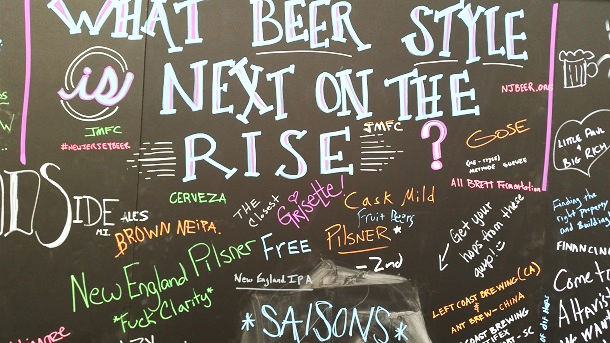 Monday musing and linking began in 2008 as a way to stay in touch during our semi sabbatical, but there hae often times I am not sure what reality I am in touch with. So rather than force the issue, next Monday there will be no links because I will be in Brazil. And I understand that because most of this week’s links were collected while I was in the midst of the rather insular experience of the Craft Brewers Conference they might look different in bright sunlight.
Monday musing and linking began in 2008 as a way to stay in touch during our semi sabbatical, but there hae often times I am not sure what reality I am in touch with. So rather than force the issue, next Monday there will be no links because I will be in Brazil. And I understand that because most of this week’s links were collected while I was in the midst of the rather insular experience of the Craft Brewers Conference they might look different in bright sunlight.
Gonzofest literary contest winner: The Great American Smoker.
Larry Bell said Monday he’s not sure when he last missed a Chicago Cubs’ home opener (which was Monday), but he thought it was important to be at CBC even though the company hums along fine with a minimum of intervention on his part. There are a lot more parties at CBC (and the Great American Beer Festival) these days, bigger, sometimes more lavish, more everything. Well, maybe not more fun. [Via Leo Weekly]
BA to Crack Down on Offensive Beer Labels.
[Via Brewbound]
Recognation awards.
[Via Brewers Association]
Brewers Association: Double-Digit Growth is Unsustainable.
[Via Brewbound]
There was news coming out of the conference.
1) Someone Tell Jim Koch About the After Party.
[Via Good Beer Hunting]
2) A Crisis of Faith, not Finances.
[Via Literature and Libation]
3) Jim Koch Is a Goddamn American Hero.
[Via HopCulture]
4) How Much is Enough? A Craft Brewer’s Response to Sam Adams’ Jim Koch.
[Via Men’s Journal}
5) Does craft beer growth matter?
[Via The Drinking Classes]
6) Vermont Farmhouse Ale Raises Questions About American Craft with Origin.
[Via Good Beer Hunting]
I know you aren’t going to read all of these, and I probably spent too much time picking the order to list them. There seems to be a lot of Jim Koch blowback — and I heard more at CBC — that gives me reason to pause. He is a lot richer than you (probably) and I (for sure), but I think he has more in common with the people on the panel I moderated at CBC than he does with Carlos Brito. Listening to people from small breweries whine about him last week reminded me of what Henry King had to say in the early aughts about a lack of institutional memory. Greg Doroski of Threes Brewing makes a perfectly valid observation in No. 4: “In a very real sense, the growth of increasingly large regional breweries and the continued emergence of small local breweries are at odds with each other.” And it was valid well before Threes opened. I’d rather write about beer itself than the business of beer or the politics of beer so I’m quitting here, but I didn’t read anything in what Koch wrote that seemed to be anti-small brewery. On the other hand, a live in as state where this happened in 2016.
The last technical, very technical, presentation {“Unintended Over-Attenuation from Dry Hopping Beers”} I sat in on at CBC, reminded me that even with all the science we’ve thrown at brewing since Louis Pasteur wrote Studies on Fermentation results that cause a brewer or brewing scientist to shake her or his head and sigh happen everyday. It’s complicated, just as my own relationship with beer is — and I suspect yours. I’ve been explaining for more than 11 years why I chose to call this blog Appellation Beer, and likely will still be until the last entry is posted. We’re talking about place-based beers and for the 1,032,415th time, the “taste of place exists, as long as it matters.” Although not every beer that might be called local tastes of a place, it hard for a beer to taste of a place and not be somehow local. And I am biased toward them.
Place is complicated in ways we wouldn’t necessarily imagine. Consider the matter of Grodziskie and the town of Grodzisk. One of Michael Jackson’s gifts to us may have been categorizing beers into styles, but it is also a curse when those styles share a name with the place they were brewed. As mentioned a couple of weeks ago, the latest dustup about the already controversial cloudy beer known by several different names has led to more shouting. Brewers are looking for a way to describe a beer new to drinkers, and pointing to something made down the road (or across the country) is handy. Defined “styles” — even when everybody bitches about the definition itself — serve a purpose. Appellations are about something else.
FROM TWITTER
Heard at Craft Brewers Conference: "New, rare & local, the 3 most important things that never made a beer taste better." #CBC17
— Bill Covaleski (@Victory_Bill) April 11, 2017
I disagree (see above). A technically perfect, wonderfully flavored beer does not exist in a vacuum. It may also excite us maybe because it has a flavor we never experienced before in beer or maybe because it was brewed by the guy who used to mow our lawn to earn money for a new baseball mitt.
Celtic Ale from Yakima Brewing & Malting was actually the beer with the nutritional information. At 99 calories it was Bert Grant’s “diet beer”.
I would only delete the word “taste” from Bill’s tweet, then I would agree.